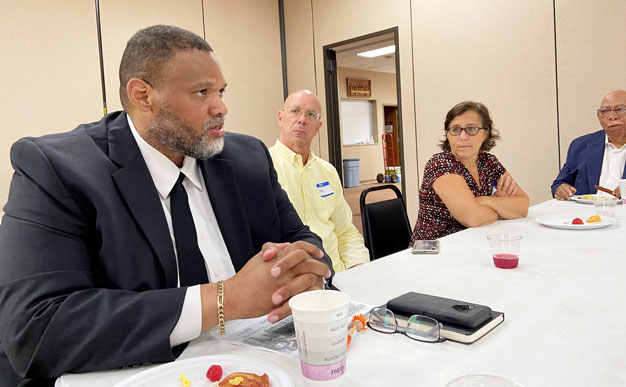
David R. Williams of Youth Advocate Programs, Inc., (YAP) talks about the agency’s work with youths during a breakfast meeting on juvenile justice July 28 at St. Anthony Catholic Church in Davenport.
By Barb Arland-Fye
The Catholic Messenger
Sentencing Project Senior Fellow Marcy Mistrett is passionate about her work to reform the juvenile justice system across the United States. That passion took her to Davenport last week to encourage community members and leaders to consider a balanced approach in working with youths who commit crimes in Scott County.
A proposed 40- to 60-bed juvenile detention center for Scott County, which would almost triple the size of the existing facility, provided the impetus for the breakfast meeting at which she spoke July 28 at St. Anthony Parish in Davenport.
The question the community must ask, she said, is this: “Is it worth $17 million to morally say to the children in this community, what we see you worth is a $17 million detention center? Or are we willing to say, we understand we need a smaller, more improved detention center, but we’ll also use a chunk of money to help you in the community?”
Mistrett was one of three speakers at the meeting. Other speakers were David R. Williams of Youth Advocate Programs (YAP), Inc., and Scott County Supervisor Ken Croken. Community activist John DeTaeye of Davenport Bearing Witness organized the event attended by invited guests including Bishop Thomas Zinkula.
In a later interview, Bishop Zinkula told The Catholic Messenger, “It makes no sense to me that the county would spend many millions of dollars building a huge new jail for juveniles when recent research and experience show that locking them up for extended periods of time is a waste of money and counter-productive. It is a much better use of revenue (much more effective) to provide services to juveniles and their families. It is even better to provide services to younger, identifiable youth-in-need prior to an offense — for preventative purposes.”
“In my experience of prison ministry, I found that it was often the case that a young man did something stupid as a juvenile living in a dysfunctional family situation, got a long sentence during the tough-on-crime era, matured while he was in prison, and then was stuck. If he committed a serious offense, it would be much preferable if he received a sentence for a shorter, more reasonable period, and there were rehabilitative services available while he was in prison. I am a firm believer in restorative justice, which includes the involvement of the victim in the process.”
As the breakfast meeting began, DeTaeye pointed out the Scott County Jail across the street. “Here at St. Anthony, we provide you with the graphics,” said Father Rudolph Juarez, pastor of St. Anthony Parish and a social justice advocate. “You can see, as John pointed out, the jail, and behind me, if you look out the window, is McAnthony Window where we feed the homeless.”
Bed capacity
Croken, the only member of the Scott County Board of Supervisors who voted against a May 25 advisory committee recommendation to build a 40- to 60-bed facility, acknowledges the need for a new facility but a smaller one. A presentation he produced shows a declining average daily population (ADP) trend — from 22.20 five years ago to 17.51 for fiscal year 2021, year to date.
Savings from building a smaller facility of 25 beds should go toward prevention, diversion and restorative justice to reduce the number of youths entering the juvenile justice system, he said. “That would obviate the need for detaining so many children,” he later told The Catholic Messenger. Furthermore, Iowa law caps the number of youth detention beds at 272 statewide. “All 272 of those beds are in operation,” Croken said. Adding beds would require a change in law.
Part of the challenge, Mistrett pointed out, stems from the Scott County Board’s reaction to the Juvenile Justice Reform Act of 2018, a bill that she and other juvenile justice advocates worked on with Sen. Charles Grassley, R-Iowa. The law prohibits juveniles charged as adults from being held in an adult jail while awaiting trial. The deadline to comply with the law is Dec. 12, 2021.
“Scott County Supervisors and Juvenile Court Service administrators are suggesting that in order to meet the increased demand for bed space, Scott County will need a 40- to 60-bed facility,” DeTaeye wrote in a Davenport Bearing Witness e-newsletter. The ADP for juveniles housed in the adult jail is 10, according to the Scott County Juvenile Detention & Alternatives Advisory Committee report (May 25, 2021).
Among other concerns, DeTaeye and others reported:
• Iowa ranks third in the U.S. for waiving young people into the adult system.
• Scott County (when compared to Polk, Linn, and Black Hawk counties) is referring a disproportionate number of Black young people into the adult system.
• Scott County Board of Supervisors plan to use $4.5 million of COVID-19 relief funds to pay for the facility.
The county estimates a $1 million annual increase to operate the facility.
Detention alternatives
“We believe there are alternatives that deserve community vetting,” DeTaeye said. Mistrett referred to some diversion efforts that show promise, such as restorative justice, in which victims and perpetrators meet, with a mediator, to talk about what happened and how to make amends.
Another alternative is programming offered through YAP, a national nonprofit that works with communities around the country, providing community-based alternatives to youth incarceration and out-of-home congregate placements. Through partnerships with youth justice and child welfare systems in 31 states and the District of Columbia, YAP provides family-based services to meet the needs of struggling youths and their families. Williams, who spoke about the successes the program has reaped in Chicago, serves as the nonprofit’s vice president-Midwest region.
Two years ago, YAP offered to provide programming to serve up to 30 Scott County families for one year with community-based services aimed at keeping youths out of juvenile detention. YAP staff include advocates who live in the same neighborhoods as program participants. The staff receive training on delivering strength-based mentorship and guidance to participants and family-centered services to their parents or guardians.
YAP offered to pick up the $500,000 tab for the first year, using donor funding to establish the program with local staff in place to be available day and night to support families with whatever they need to thrive, Williams said. Communities would assume responsibility for continuing funding for the program in subsequent years.
The pandemic got in the way of a YAP partnership in Scott County, but Williams anticipates future partnerships in the community. Bettendorf Police Chief Keith Kimball told the gathering that many youths who have a brush with the law do not end up in the juvenile detention center. Those sent to detention have committed bad crimes. They have no family structure, he said. “Those are the kids we want to work with,” Williams said. The intervention with families has to happen when the kids are younger, Kimball advised.
A balanced approach
LaDrina Wilson, an advocate for alternatives to detention and a crime victim, said she understands and appreciates crime victims’ desire for justice and safety. A consultant who works with companies in the area of equity, diversity and inclusion, she supports a balanced approach to the juvenile justice system. A new detention center is necessary but so are programs to help youths before they get to the point of detention, she believes. She encouraged the gathering to begin educating the public on social media outlets.











